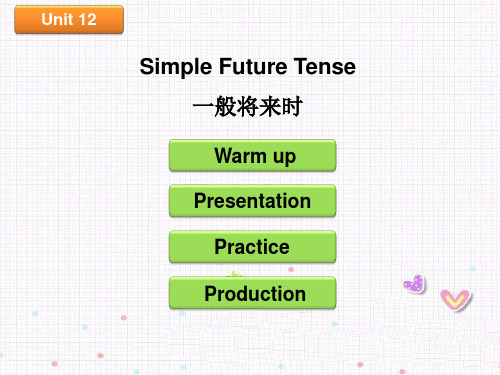9小学英语一般将来时课件PPT演示.ppt
合集下载
一般将来时课件PPT.

否定式:will not =
will句式总结:
音走
否定
一般线问 B笃
I will have
I won't have Will I have
Yes,I will.
many presents• many presents. many presents? No,I won't.
He will do dull He won't do
She' s going to shop/ go shopping…
What is the cat going to do ? will
It is going to drink/eat.
will
What are they going to do this evening? They are going to watch TV
The Simple Future Tensol
. 表一示般一将个来将时要:至生的动作或状态。常与表示
将来的时间状语连用 如:
tomorrow(明天 ) before long( 不久 ) the day after tomorrow( 后天 ) next week(下周)
soon(很快)
in the future( 将来 )
Look at the clouds! It' s going to rain!
(表示有迹象要发生某一动作时,要用be going to)
will
What are they going to do ?
They are going to dance.
0 Ask and r at!SW6 (WKat is he going to do?)
一般将来时课件(PPT)

2. be going to+do可表示事先计划的意图,而 will 则表示说话人当时决定的意图;
We're going to drive you home after the meeting. Don't call a taxi. We'll drive you home.
I feel ill now, and I'll go to see the doctor. I'm going to see the some meat in the fridge soon. (变一般疑问句) W __i_ll he _f_in_d _a_n_y_ meat in the fridge?
3.She will stay there in a week. (对划线部分提问) __H_o_w _s_o_on_ w_i_ll__ she _s_t_a_y_ there?
①
②
③
① Who will have an English party next week ?
② What will they have next week ?
③ When will they have an English party?
2. be going to 表将来
will 和be going to 的区别
school late. Tomorrow he _w_il_l _get (get) up very early, so he _w_o_n’t be (not be) late for school tomorrow.
1.Lucy will do her homework at home soon. (改否定句) Lucy _w_o_n’_t_d_o_ her homework at home soon.
一般将来时课件(PPT)

“be able to”表示将来有能力做某 事时,使用一般将来时形式,例如“I will be able to help you”。
情态动词如“can”、“may”、 “must”等,在一般将来时中通常直 接加动词原形,例如“I can swim”。
03
一般将来时在句子中的运用
陈述句中的使用
表示将要发生的动作或存在的状态
纠正方法
应使用正确的将来时形式,如 "He will go to the park tomorrow." 或 "He is going to the park tomorrow."
忽略动词变化规则
错误示例
They will play football in the future.(忽略了动词play在将来时中的变化)
纠正方法
在将来时中,应使用正确的助动词或情态动词形式,如 "I will be able to help you with your homework." 或 "I can help you with your homework."
错误示例
He will must finish his work before leaving.(错误地使 用了情态动词must)
作用
用于表示未来的计划、打算、预测、 假设等。
常见表达形式
will + 动词原形
表示将来的动作或状态,如“I will go to the park tomorrow.”(我明天将去公园。)
be going to + 动词原形
表示计划、打算或即将发生的动作,如“I am going to study hard this semester.”(我这 学期打算努力学习。)
一般将来时课件ppt(共17张PPT)

Jim going to
afternoon?
in the playground tomorrow
4. .Jim is going to play football in the playground tomorrow afternoon.
Jim going to play football tomorrow afternoon?
2)在浊辅音和元音后读/d/.
一般过去时, 要用动词过去式. Jim is going to play football in the playground tomorrow afternoon.
Jim is going to play football in the playground tomorrow afternoon. ⑵are变为were。
there were many beautiful flowers there. 一般将来时表示将来某个时间要发生的动作或存在的状态常与表示将来的时间状语连用
⑴am ,is变为was。
So she They to read some books.
What did they do in the park? 1)在清辅音后读/t/ .
(3).动词过去式变化规则
a)一般情况下,直接加ed.如:wash--washed, look---looked; b)以不发音字母e结尾的,加d.如:like---
liked, dance---danced; c)以“辅音字母+y”结尾的,变y为i再加ed. 如:study---studied;
food and (play) lots of games. They
(come) home at 4:30.
一般将来时PPT课件

A. will go B. won’t go C. can go D. went
一、单项选择
(C) 1. There __________ a meeting tomorrow afternoon.
A. will be going to B. will going to be C. is going to
shall常用于第一人称. shall
否定式:shall not = shan’t
will常用于第二、三人称,但在 will 口语中各种人称都可以用will.
否定式:will not = won’t
四、现_在___进__行___时态 + 表示将来的时 间状语也可以表示将来。
五、There be 句型的一般将来时态 的结构:there +is_g_o_in_g_to_ + be + 名词或there + will+ be + 名词。
begoingto表示根据主观判断将来肯定发生的事情表示根据主观判断将来肯定发生的事情will表示客观上将来势必发生的事情
The Simple Future Tense
一、一般将来时表示将来某一 时刻的动作,状态以及打算。 该时态一般与表示将来意义 的时间状语连用。如:
tomorrow, this month, the day
next week.
A. will be; is
B. is; is C. will be; will be D.
is; will be
(D) 4. There ________ a dolphin show in the zoo
tomorrow evening.
A. was B. is going to have C. will have D. is going
一、单项选择
(C) 1. There __________ a meeting tomorrow afternoon.
A. will be going to B. will going to be C. is going to
shall常用于第一人称. shall
否定式:shall not = shan’t
will常用于第二、三人称,但在 will 口语中各种人称都可以用will.
否定式:will not = won’t
四、现_在___进__行___时态 + 表示将来的时 间状语也可以表示将来。
五、There be 句型的一般将来时态 的结构:there +is_g_o_in_g_to_ + be + 名词或there + will+ be + 名词。
begoingto表示根据主观判断将来肯定发生的事情表示根据主观判断将来肯定发生的事情will表示客观上将来势必发生的事情
The Simple Future Tense
一、一般将来时表示将来某一 时刻的动作,状态以及打算。 该时态一般与表示将来意义 的时间状语连用。如:
tomorrow, this month, the day
next week.
A. will be; is
B. is; is C. will be; will be D.
is; will be
(D) 4. There ________ a dolphin show in the zoo
tomorrow evening.
A. was B. is going to have C. will have D. is going
《一般将来时》课件

be going to+动词原形
结构
主语+be going to+动词原形+其他 成分
例子
We are going to meet at the train station at 5:00.(我们计划在5点钟 在火车站见面。)
含义
表示计划或安排将来要发生的动作或 状态
用现在进行时表示
结构
主语+be+动词现在分词+ 其他成分
一般将来时可以用来表示对未来事件的预见或推测,通常与时间状语连用,如“in the future”、 “next year”等。例如,“It will rain tomorrow.”(明天会下雨。)
表示意图、打算或希望
总结词
表示个人的意图、打算或意图、打算或希望,通常与 表示意图的动词连用,如“plan”、“intend”、“hope” 等。例如,“I will visit my grandparents next week.”( 我打算下周去看望我的祖父母。)
含义
表示将来某个时间正在进 行的动作或状态
例子
He is coming here next week.(他下周将会来这 里。)
用一般现在时表示
结构
主语+动词原形+其他成分
含义
表示将来某个时间经常发生的动作或状态
例子
I do my homework every day.(我每天都会做作业。)
03
一般将来时的肯定句、否定句和 疑问句
感谢观看
基本构成
will + 动词原形
疑问句形式
Will + 主语 + 动词原形
否定句形式
一般将来时课件PPT.上课用

注意事项
与“be going to + 动词原形”和“will + 动词原形”相比,“be about to + 动词原形”更强调即将发生的紧迫性。
04
一般将来时的否定形式
will not = won’t
01
"will not" 是 "will" 的否定形式 ,表示将来某个时间不会发生某 件事情。
明年这个时候我们将在巴黎度假。
表示未来的时间状语从句的连用
一旦你完成这个项目, 你就可以休息了。
即使明天下雨,我们 也会按时举行运动会。
只要他一回来,我们 就出发。
表示未来的时间状语从句的省略
明天见。 下周再见。
明天这个时候我们会在飞机上。
THANKS
主语 + will not + 动词原形 + 其他成分,例如:He will not come back until next month.(他下个月之前不会回来。)
Will + 主语 + 动词原形 + 其他成分,例如:Will you be available this afternoon?(你今天下午有空吗?)
表示预测和推测
总结词
一般将来时也可以用来表示对未来的预测和推测,通常基于 某种事实或证据。
详细描述
当我们根据已知事实或证据推断某件事情将在未来发生时, 可以使用一般将来时。例如,“根据天气预报,明天会下雨 ”表示对天气的预测,“根据市场趋势,明年房价可能会上 涨”表示对未来的推测。
表示意愿和打算
05
一般将来时的疑问形式
will + 主语 + 动词原形?
总结词
与“be going to + 动词原形”和“will + 动词原形”相比,“be about to + 动词原形”更强调即将发生的紧迫性。
04
一般将来时的否定形式
will not = won’t
01
"will not" 是 "will" 的否定形式 ,表示将来某个时间不会发生某 件事情。
明年这个时候我们将在巴黎度假。
表示未来的时间状语从句的连用
一旦你完成这个项目, 你就可以休息了。
即使明天下雨,我们 也会按时举行运动会。
只要他一回来,我们 就出发。
表示未来的时间状语从句的省略
明天见。 下周再见。
明天这个时候我们会在飞机上。
THANKS
主语 + will not + 动词原形 + 其他成分,例如:He will not come back until next month.(他下个月之前不会回来。)
Will + 主语 + 动词原形 + 其他成分,例如:Will you be available this afternoon?(你今天下午有空吗?)
表示预测和推测
总结词
一般将来时也可以用来表示对未来的预测和推测,通常基于 某种事实或证据。
详细描述
当我们根据已知事实或证据推断某件事情将在未来发生时, 可以使用一般将来时。例如,“根据天气预报,明天会下雨 ”表示对天气的预测,“根据市场趋势,明年房价可能会上 涨”表示对未来的推测。
表示意愿和打算
05
一般将来时的疑问形式
will + 主语 + 动词原形?
总结词
小学英语语法课件- 一般将来时 (共36张PPT) 全国通用

Presentation Sentences
She will take swimming lessons in this vacation. 她今年假期要去学游泳。 She is going to go shopping tomorrow. 她明天要去购物。 Jim will open a shop on internet. 吉姆打算要在网络上开个店。 Jim is going to be an actor when he grows up. Jim长大了想当一名演员。
___t_o_m_o_r_ro_w_.____________________________ 一般疑问句:A__re_t_h_e_c_h_il_d_re_n_g_o_i_ng__to__w_a_tc_h_a_d_o_l_p_h_in_s_h_o_w__
t_o_m_o_r_ro_w_?____________________________ There will be a great concert next week. 否定句:_T_h_e_r_e_w_il_l _n_o_t b_e__a_g_re_a_t_c_o_n_ce_r_t _n_ex_t_w_e_e_k_. ______ 一般疑问句:_W_i_ll_th_e_r_e_b_e_a_g_r_e_a_t _co_n_c_e_rt_n_e_x_t_w_e_e_k?______
Practice Oral Practice
小组合作完成单项选择,并朗读句子
( C ) There __________ a meeting tomorrow afternoon.
A. will be going to
B. will going to be
C. is going to be
- 1、下载文档前请自行甄别文档内容的完整性,平台不提供额外的编辑、内容补充、找答案等附加服务。
- 2、"仅部分预览"的文档,不可在线预览部分如存在完整性等问题,可反馈申请退款(可完整预览的文档不适用该条件!)。
- 3、如文档侵犯您的权益,请联系客服反馈,我们会尽快为您处理(人工客服工作时间:9:00-18:30)。
/ year, this afternoon/ evening….等。
结构:主语+be动词+going to +动词原形+时间副词
主语+ will+ 动词原形+时间副词
例如:Jim is going to play football. Jim will play football.
否定形式:把be动词或will后面加not 例如:Jim is not going to play football.
我打算明天写作业。 他将要下周上学。 他们打算今晚看电视。
一般将来时(the future tense)
一般将来时表示将要发生的事或打算、计划
决定要做的事情。常与表示将来的时间状语连用。
标志性词:tomorrow, next, soon, tonight, next week/ weekend/ month
在什么时候 (提问时间) 选择哪一个(提问人或物) 谁 (提问人) 怎么样 (提问方式)
疑问词在句首,系动词be跟着走, 主语、going紧相随,其它成分不要丢。
顺口溜小记:
不久将要发生事,记住要用将来时。 be后紧跟going to,to后跟着动原形。 be有形式多变化,记得随着主语及时变。
I+am He/She+is You/We/They+are 某个人名+is如:Mike is
Jim will not play football. 一般疑问句:把be动词或will调到句首, 例如:Is Jim going to play football?
Will Jim play football?
小练笔:
并变否定句、一般疑问句
1、我打算明天去打扫我的房间。
I'm going to clean my room tomorrow.
一般将来时:
构成:be going to + 动词原形
I am going to listen to music.
一般将来时:
构成:will + 动词原形
I will listen to music.
一般将来时的标志:
this evening, next week等。
构成:
be going to /will+ 动词原形+将来的时间 I will play football this afternoon. I am going to wash clothes next week.
(the future tense)
•I’ m going to buy a book. •I’ m going to take a look. •I’ m going to bake a cake. •I’ m going to walk near a lake. •We’ re going to take a trip. •We’ re going to take a sip. •I’ m going outside to play. •I’ m going to have a good day.
主语+be going to +动词原形+时间副词。
主语+will +动词原形+时间副词。
人称主语: 单数 第一人称: I 第二人称: you 第三人称: he\ she\
it\ (人名)
复数 we
you they
be 动词: am (与第一人称搭配) are (与第二人称或所有复数主语) is (o ride a bike. They will ride a bike.
What is Hui Tailang going to do?
He is going to ski.
What is Lan Yangyang going to do?
He is going to sweep the floor.
火眼金星。看看下面的句子病在哪里呢?
1. We are going tovigsritandparents tomorro 2. She isgoing to go soon. 3. He is going toreabdooks this evening. 4. My parents is going to Beijing next we
He is going to catch butterflies.
Be going to 句型
be going to +动词原形:用来表示近期将要发生的动作, 或打算要做的事。
Will 译成 将要
经常跟一些表示将来时间的时间状语如:tomorrow、 this weekend、next week等连用,用来表示一般将 来时态。
Be going to句型的特殊疑问句形式。
疑问词 + Be动词 +主语 + going (to) +(动作)+(时间副词)?
W常he用re的疑are问词有y:ou going to play
tonight ?
what where when which who how
什么(提问事情) 在哪里 (提问地点)
2、他这个周末准备去拜访他的祖父母。 He is going to visit his grandparents this weekend.
3、他们下周去旅行。
They are going to take a trip next week.
一般将来时的构成:
主语 + be going to + 地方 / 动词原形+(将来时间)…..
What is Xi Yangyang going to do?
He is going to wash the clothes.
What is Lan Yangyang going to do?
He is going to swim.
What is Fei Yangyang going to do?
将来的时间:
this afternoon
this evening tonight
tomorrow
next week
next weekend next holiday
next month
…等等
next year
What are they going to do? What will they do?
结构:主语+be动词+going to +动词原形+时间副词
主语+ will+ 动词原形+时间副词
例如:Jim is going to play football. Jim will play football.
否定形式:把be动词或will后面加not 例如:Jim is not going to play football.
我打算明天写作业。 他将要下周上学。 他们打算今晚看电视。
一般将来时(the future tense)
一般将来时表示将要发生的事或打算、计划
决定要做的事情。常与表示将来的时间状语连用。
标志性词:tomorrow, next, soon, tonight, next week/ weekend/ month
在什么时候 (提问时间) 选择哪一个(提问人或物) 谁 (提问人) 怎么样 (提问方式)
疑问词在句首,系动词be跟着走, 主语、going紧相随,其它成分不要丢。
顺口溜小记:
不久将要发生事,记住要用将来时。 be后紧跟going to,to后跟着动原形。 be有形式多变化,记得随着主语及时变。
I+am He/She+is You/We/They+are 某个人名+is如:Mike is
Jim will not play football. 一般疑问句:把be动词或will调到句首, 例如:Is Jim going to play football?
Will Jim play football?
小练笔:
并变否定句、一般疑问句
1、我打算明天去打扫我的房间。
I'm going to clean my room tomorrow.
一般将来时:
构成:be going to + 动词原形
I am going to listen to music.
一般将来时:
构成:will + 动词原形
I will listen to music.
一般将来时的标志:
this evening, next week等。
构成:
be going to /will+ 动词原形+将来的时间 I will play football this afternoon. I am going to wash clothes next week.
(the future tense)
•I’ m going to buy a book. •I’ m going to take a look. •I’ m going to bake a cake. •I’ m going to walk near a lake. •We’ re going to take a trip. •We’ re going to take a sip. •I’ m going outside to play. •I’ m going to have a good day.
主语+be going to +动词原形+时间副词。
主语+will +动词原形+时间副词。
人称主语: 单数 第一人称: I 第二人称: you 第三人称: he\ she\
it\ (人名)
复数 we
you they
be 动词: am (与第一人称搭配) are (与第二人称或所有复数主语) is (o ride a bike. They will ride a bike.
What is Hui Tailang going to do?
He is going to ski.
What is Lan Yangyang going to do?
He is going to sweep the floor.
火眼金星。看看下面的句子病在哪里呢?
1. We are going tovigsritandparents tomorro 2. She isgoing to go soon. 3. He is going toreabdooks this evening. 4. My parents is going to Beijing next we
He is going to catch butterflies.
Be going to 句型
be going to +动词原形:用来表示近期将要发生的动作, 或打算要做的事。
Will 译成 将要
经常跟一些表示将来时间的时间状语如:tomorrow、 this weekend、next week等连用,用来表示一般将 来时态。
Be going to句型的特殊疑问句形式。
疑问词 + Be动词 +主语 + going (to) +(动作)+(时间副词)?
W常he用re的疑are问词有y:ou going to play
tonight ?
what where when which who how
什么(提问事情) 在哪里 (提问地点)
2、他这个周末准备去拜访他的祖父母。 He is going to visit his grandparents this weekend.
3、他们下周去旅行。
They are going to take a trip next week.
一般将来时的构成:
主语 + be going to + 地方 / 动词原形+(将来时间)…..
What is Xi Yangyang going to do?
He is going to wash the clothes.
What is Lan Yangyang going to do?
He is going to swim.
What is Fei Yangyang going to do?
将来的时间:
this afternoon
this evening tonight
tomorrow
next week
next weekend next holiday
next month
…等等
next year
What are they going to do? What will they do?
